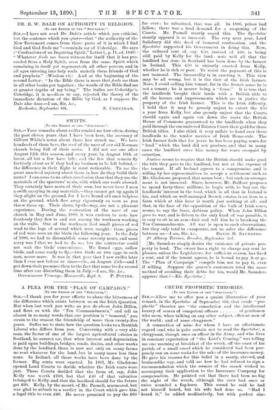A PLEA FOR THE " PLAN OF CAMPAIGN."
[To THE EDITOR OF THE " SPECTATOR." J
SIR,—I thank you for your efforts to abate the bitterness of the difference which exists between us on the Irish Question. But when last week you write as you do about John Dillon, and flout us with the " Ten Commandments;" and tell us almost in so many words that our position is " immoral," you strain to the utmost the friendship of more than twenty-five years. Suffer me to state how the question looks to a Scottish Liberal who differs from you. Conversing with a very able man, the factor of one of the largest agricultural estates in Scotland, he assures me, that when interest and depreciation is paid upon buildings, bridges, roads, drains, and other works done by the landlord, there is now not only on many farms no rent whatever for the land, but in many cases less than none. In Ireland, all these works have been done by the farmer. Big rents were exacted. In 1881, Mr. Gladstone opened Land Courts to decide whether the Irish rents were just. These Courts decided that the farm of, say, John Kelly was worth £100, but that £40 of that valuation belonged to Kelly, and that the landlord should for the future get £60. Kelly, by the mouth of Mr. Parnell, murmured, but was glad to submit to a verdict in the Court which gave him a legal title to even £40. He never promised to pay the £60 for ever ; he submitted, that was all. In 1886, prices had fallen ; there was a loud demand for a reopening of the Courts. Mr. Parnell stoutly urged this. The Spectator stoutly opposed it as immoral. The very next year, Lord Salisbury did this deed of immoral confiscation, and the Spectator supported his Government in doing this. Now, the reduced rent of, say, £50, instead of £60, is being still paid by Kelly for the land : note well all that the landlord has done in Scotland has been done by the farmer in Ireland. This £50 is unjustly exacted from Kelly, whether he is rich or poor. To resist the payment of this is not immoral. The immorality is in exacting it. This view may be all wrong, but it is the view of the Irish farmer. Note, I avoid calling him tenant, for in the Scotch sense he is not a tenant ; he is nearer being a " feuar." It is true that the landlords bought their lands with a British title to all the houses and improvements which are in justice the property of the Irish farmer. This is the Irish difficulty. I hold that it may be grossly unjust to extort the £50 a, year from Kelly, but also grossly unjust that the Courts should again and again cut down the rents the British House of Commons guaranteed to the landlords when they paid through the encumbered Estates Court their gold for these British titles. I also think it very unfair to hand over these landlords to the tender mercies of Irish Home-rule. The Irish farmer feels that for years he has been paying rents for " land " which the land did not produce, and that in many cases the landlord owes him money for rents overpaid by extortion.
Justice seems to require that the British should make good the title they gave to the landlord, but not at the expense of the tenant. If all Ireland agrees to a compromise, and is willing by her representatives to accept a settlement such as Mr. Gladstone proposed, that seems best ; but such an arrange. ment is not immoral. Since, however, Mr. Balfour proposes to spend forty-three millions, to begin with, to buy out the landlords' interest in the land, which is all that in Ireland is his, and which on well-managed Scotch estates is an item in a farm which at this hour is worth just nothing at all ; and that, in the face of the opposition of the bulk of Irish votes, seems, to say the least, dubious policy. When John Dillon goes to war, and is driven to the only kind of war possible, it is easy to sit in an arm-chair and tell him he is breaking the Ten Commandments. All war is open to such observations, but they only tend to exasperate, not to solve the difference [Mr. Saunders simply denies the existence of private pro- perty in land. The owner has a right to charge any rent he pleases, unless the Legislature, for sufficient reason, has fixed a rent, and if the tenant agrees, he is bound to pay it or go. The " Plan of Campaign " compels him not to pay it, even if willing. Suppose the grocer's customers tried the same method of avoiding their debts for tea, would Mr. Saunders approve that P—En. Spectator.]






































 Previous page
Previous page